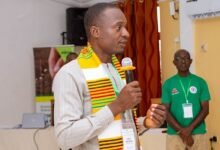
Ghana has signed a financing agreement with European Union (EU) for a 40 million Euro grant, under the latter’s budget support programme, to promote investment and job creation.
It is the last programme to be signed from Ghana’s indicative allocation of 323 million Euros under the 11th European Development Fund and National Indicative Programme which spans between 2014 and 2020.
The programme aims to promote domestic and foreign private investment, enhance economic transformation, create employment, strengthen public financial governance and fight corruption.
The budget support is also expected to promote the achievement of the Sustainable Development Goals (SDGs) in Ghana and further the Ghana Beyond Aid Vision.
Ghana’s Minister of Finance, Mr Ken Ofori-Atta and EU Ambassador to Ghana Ms Diana Acconcia, signed the agreement on Thursday at a ceremony in Accra attended by some representatives of EU member states.
The support of the EU, according to Mr Ofori-Atta, would advance efforts being made by the government to build a resilient economy and move the country beyond aid and towards partnerships.
He indicated that since its assumption of office, government’s promotion of investments, entrepreneurship and job creation had been evidenced by its policies and programmes.
He cited the National Entrepreneurship and Innovation Plan (NEIP), Nation Builders’ Corps (NaBCo), Planting for Food and Jobs as some of the initiatives through which jobs and training had been provided to more than 100,000 youth with more in the offing.
The One-District- One-Factory, One–Region-One-Industrial Park programmes, he said were other avenues through which the government was enhancing the private sector and creating job opportunities.
The finance minister said the adoption of new approach and reforms by the government to restore macroeconomic stability had yielded results, while strategies were being put in place to sustain the economy post International Monetary Fund (IMF).
He pointed out that the Ghana beyond Aid vision was on course and stressed the need for the country to, instead of opting for aid, partner the EU to realise the vision.
“Government is very optimistic and will stay committed to ensure that the vision of a WISER (wealth, innovative, sustainable, empowered and resilient) society is achieved, we are determined to get there,” Mr Ofori-Atta said.
Ms Acconcia, on her part, described the budget support programme as a “perfect example of African-Europe Alliance in action” and hoped that it intended aim of helping create a conducive climate for business is achieved.
She said the EU was looking forward to the activation of the Special Prosecutor’s Office to enhance the fight against corruption, which is a crucial part of the creation of a crucial business climate.
She expressed the hope that the support would yield the expected results.
BY JONATHAN DONKOR







